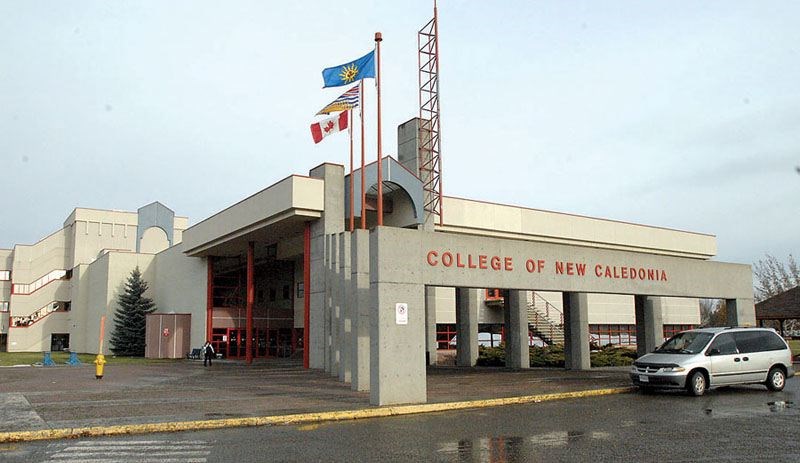For the first time in eight years, the College of New Caledonia is projecting a surplus as it prepares for next year's budget.
"We have a soft number right now that is around $100,000 to $200,000 as it's unrolling," said CNC president Henry Reiser last week.
It's a welcome change after a streak of deficits stretching back to 2008 and one that Reiser said is a credit to a rise in enrollment, diverted layoffs and an ongoing restructuring across the college's six campuses that has resulted in significant savings. The college reported an "in year" surplus of $1-million after its January board meeting, in large part because it managed to save the majority of staff who received layoff notices March last year.
The college had to account for each severance package attached to 21 faculty notices and 18 CUPE notices, which helped create the $2.8 million deficit last year.
Instead, eight faculty members were laid off alongside six CUPE members, making last year's deficit, in actuality, much smaller.
On top of that, "we have been very, very careful in our spending of our budgets and we had significant reductions in internal activities like travel and meals and things of this nature," Reiser said.
The college said it is unlikely layoff notices will be sent out this March.
"We're not sure of at this stage of the game but we are going to continue with our frozen intake for our dental hygiene program but we're not looking at thinking at this stage that there will be layoffs," Reiser said.
Part of the savings can be attributed to the continued suspension of the two-year dental program, which earned strong community backlash. The college had said it hoped to suspend the program for a year and then in November extended it at least another year, which affects the 2016 intake.
But the difference maker in next year's expected surplus, Reiser said, is the overall uptick in student enrollment combined with additional student fees instituted last year over and above the annual tuition increase of two per cent (the maximum amount permitted by the B.C. government)
"That has been what's made the difference," said Reiser, highlighting the "significant increase" in international student numbers.
The board voted at its Jan. 15 meeting to increase tuition and mandatory fees by two per cent, which it said is common practice for post-secondary institutions. The University of Northern B.C. also increases tuition by that margin every year.
Recruitment can take some of the credit, but Reiser also pointed to the work of its partners at the city, UNBC and School District 57.
"There's a lot of conversation on making Prince George an educational destination and marketing the city has done and that has been very, very helpful."
He also credited word of mouth from current and past international students as well as Prince George's Indo-Canadian community for helping get the word out.
"We've been very active in recruiting in India in particular," he said. "So it's been a number of different initiatives that are coming together that are being successful."
The college hasn't reported this year's student numbers yet, but it seems to follow a trend from previous years. Last year CNC reported 334 international students, up from 290 the year before.
Last year CNC had 3,571 full-time students, a jump of more than 200 students from the year before, which saw 3,342 full-time equivalent (FTE) students. Trades have also consistently been a strong point for the college, as its most popular program with 1,385 full-time students last year. Reiser said the province's work to broadcast trade opportunities has helped.
"We're seeing a much better uptake and what's also interesting is that industry is responding by indenturing more apprentices and those apprentices are taking their level training as well," he said.
The college is in the midst of preparing a five-year strategic plan, and has put the call out for community consultation for the end of this month. It's part of an ongoing restructuring project, which Reiser spearheaded in January 2015.
“What’s in fact happening is that the programming and the processes that we are using, financial and human resources have created efficiencies that we are finding, have improved our delivery and our operation.”
That includes having regional principals and standardizing its approach to education across its campus.
“The intent is to strengthen academic standards and equity of student services at all campuses, ensure resources are distributed strategically and effectively across the institution and meet both regional and local college education objectives,” said Reiser in a newsletter to students addressing the 2015-16 Action Plan.
In the same newsletter, Reiser noted the college’s first attempt to restructure, named the “One College Plan,” was abandoned after the college found the “title was subject to misunderstanding.”
It has since undergone “rigorous editing and revision,” to get to the current stage. At its regional campuses, the college has moved away from social programming that don’t fall in line with educational objectives.
Part and parcel of the redesign is CNC’s movement in the direction of digital teaching.
Last spring Northern Gateway and TransCanada each donated $250,000 to the college, most of which would be used for CNC develop the online course delivery program called the Digital Delivery Initiative (DDI).
Reiser said the college is working on the final design but has a pilot up and running in both the Prince George and Quesnel campuses.
“We’re going to try and be aggressive as we can but realistically if everything goes well, we may have connectivity to our regional campuses hopefully by 2017, probably more likely by 2018,” he said.
“That’s going to bring more students into CNC,” he said, especially applicants who historically wouldn’t have applied “because of restrictions, age, commitments. The goal is ultimately to have people be able to take our courses even at home.”
CNC is expected to present its its final operating budget for 2016/17 at the April board meeting.



